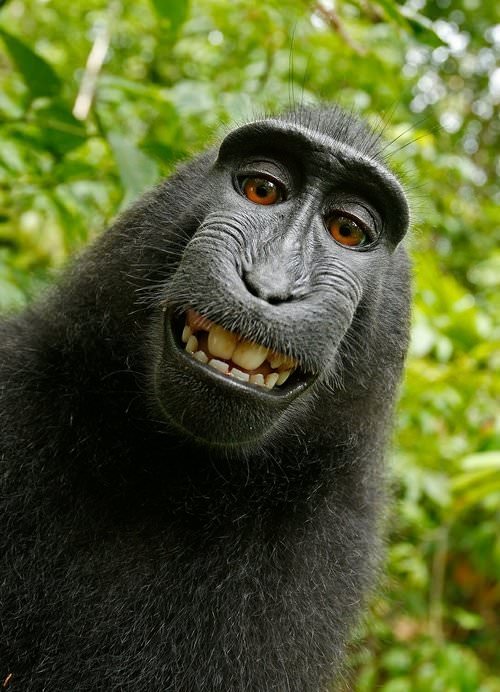Mr Slater later published these photos in a book. He claimed ownership of copyright in the images – which went viral and triggered a three year legal battle over whether monkeys can legally own copyright in photographs.
Naruto’s case was pursued by the People for the Ethical Treatment of Animals (PETA), who argued that works created by an animal hold a valid copyright, belonging to that animal. PETA alleged that Mr Slater had infringed Naruto’s copyright by displaying, advertising, reproducing, offering for sale, and selling copies of the ‘monkey selfies’ (as they became known).
The case was first heard by a US district Court in California, which concluded that monkeys do not have the same rights as humans under the US Copyright Act. The claim was dismissed. PETA appealed, on the basis that US copyright law doesn’t exclude animals and that ‘authorship’ should be construed in the widest sense.
Before the appeal, PETA and Mr Slater agreed that Mr Slater could keep the copyright in the images if he donated 25% of the earnings from his book to charities ‘that protect the habitat of Naruto and other crested macaques in Indonesia’. Despite this settlement, the US Appeals Court decided to rule on the case, and upheld the previous Court’s decision.
Ruling unanimously, the Court concluded that US copyright law does not ‘expressly authorise animals to file copyright infringement suits.’ It went on to say, ‘we conclude that this monkey – and all animals, since they are not human – lack statutory standing under the Copyright Act’. In other words, the Court held that the monkey did not have the ability to sue Mr Slater.
In its judgment, the Court was very critical of PETA, stating that the settlement did not directly benefit Naruto and instead served PETA’s ‘institutional interests’. The Court even accused PETA of abandoning Naruto after the settlement had been reached, leading it to question whether, if Naruto was human, he could have sued PETA for breach of confidential relationship for failing to pursue his interests before their own.
Although an unusual case, it does raise important questions about non-human copyright in works and whether the growth of artificial intelligence should result in the widening of what (rather than who) an author is.
If you have any questions or would like to talk about your Intellectual Property, get in touch with our IP lawyerstoday.



